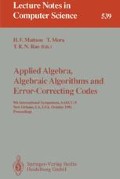Abstract
Let K[X] be a multivariate polynomial ring over a field K, and let U ⊑ X. We call f ∈ K[X] pseudo-homogeneous in U if either it contains no variable of U, or each of its terms does. U ⊑ X is called an H-set for F ⊑ K[X] if each f ∈ F is pseudo-homogeneous in U. We show that when computing an elimination ideal of some ideal (F) of K[X] w.r.t. V ⊑ X, one may disregard all those elements of F that contain variables from some H-set U ⊑ X/V for F. For given F and V, we compute a maximal H-set for F contained in V. Furthermore, we discuss how one can compute gradings by weighted total degree that make a given finite F ⊑ K[X] homogeneous. For certain limited purposes, one can then compute truncated Gröbner bases instead of full ones.
Preview
Unable to display preview. Download preview PDF.
References
W. Böge, R. Gebauer, and H. Kredel, Some examples for solving systems of algebraic equations by calculating Gröbner Bases, J. Symbolic Computation 1, 83–98 (1985)
B. Buchberger, Gröbner bases: an algorithmic method in polynomial ideal theory, in: N.K. Bose (ed.), Progress, Directions, and Open Problems in Systems Theory, 184–232, D. Riedel Publ. Comp. (Dordrecht 1985)
M. Caboara, Dynamic evaluation of Gr-bner bases, Communication at the CAMASA '91 Meeting, Cagliari 1991
E.G. Coffman Jr. (ed.), Computer and Job-Shop Scheduling Theory, John Wiley & Sons, New York (1976)
R. Gebauer, H.M. Möller, On an installation of Buchberger's algorithm, JSC 6 2/3, 185–91 (1988)
V.P. Gerdt, A.B. Shavachka, A. Zharkov, Computer algebra application for classification of integral non-linear evolution equation, JSC 1, 101–107 (1985)
P. Gritzman and B. Sturmfels, Minkowski addition of polytopes: computaional complexity and applications to Groebner bases, Preprint, Cornell University (1990)
D. Lazard, Gröbner bases, Gaussian elimination, and resolution of systems of algebraic equations, Proc. EUROCAL '83, Springer LNCS 162, 146–156 (1983)
C.E. Miller, A.W. Tucker, and R.A. Zemlin, Integer programming formulation and traveling salesman problems, J. ACM 7 (1960)
H.M. Moeller and T. Mora, Upper and lower bounds for the degree of Gröbner bases, Proc. EUROSAM '84, Springer LNCS 174, 172–183 (1984)
T. Mora and L. Robbiano, The Groebner fan of an ideal, JSC 6 183–208 (1988)
C.H. Papadimitrou and K. Steglitz, Combinatorical Optimization, Prentice Hall, Eaglewood Cliffs (1982)
L. Robbiano, On the theory of graded structures, JSC 2, 139–170 (1986)
Author information
Authors and Affiliations
Editor information
Rights and permissions
Copyright information
© 1991 Springer-Verlag Berlin Heidelberg
About this paper
Cite this paper
Becker, T. (1991). Homogenity, pseudo-homogenity, and Gröbner basis computations. In: Mattson, H.F., Mora, T., Rao, T.R.N. (eds) Applied Algebra, Algebraic Algorithms and Error-Correcting Codes. AAECC 1991. Lecture Notes in Computer Science, vol 539. Springer, Berlin, Heidelberg. https://doi.org/10.1007/3-540-54522-0_96
Download citation
DOI: https://doi.org/10.1007/3-540-54522-0_96
Published:
Publisher Name: Springer, Berlin, Heidelberg
Print ISBN: 978-3-540-54522-4
Online ISBN: 978-3-540-38436-6
eBook Packages: Springer Book Archive

